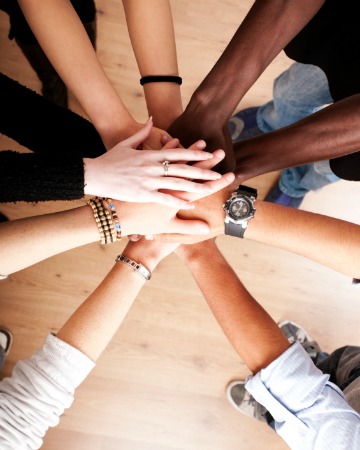
United for Ethan
Justice. Education. Training. Awareness.
In the wake of the death of Robert Ethan Saylor, national and local Down syndrome organizations are calling for awareness and action. But which rally cry will succeed — and which reflects what families of individuals with Down syndrome want from their national organizations?
“Ethan” Saylor had Down syndrome and died after being restrained by three off-duty Frederick County, Maryland, Sheriff’s deputies. While the coroner ruled Saylor’s death a homicide, a grand jury declined to indict the deputies.
F.R.I.E.N.D.S., or Family Resource, Information & Education Network for Down Syndrome, initiated a meeting this week between the U.S. Department of Justice’s Community Relations Services office, national Down syndrome organizations and local representatives, including Ethan's mother Patti Saylor.
After the meeting, the National Down Syndrome Society and the National Down Syndrome Congress issued starkly different press releases and messages.
NDSS announced it would participate in a collaborative effort to develop a training program accessible to first responders nationwide.
NDSC focused on Saylor’s civil rights and called for an independent investigation into his death.
Lou Ruffino, spokesperson for the Department of Justice's community relations service, called the meeting "mostly a listening session," adding that the agency continues to monitor the situation.
"There are no concrete action steps at this time," Ruffino said. "It’s a little bit early for us. We’re trying to assess the situation and see how much community tension there is."
NDSC calls for action
“We cannot comprehend the series of poor decisions that were made leading to Ethan’s death,” noted David Tolleson, executive director of NDSC. “If you used any other adjective to describe him — such as his race, religion, gender or sexual orientation — the streets would be filled with people seeking justice. It appears that individuals at the theater acted as if this was an emergency situation, or that Ethan presented an imminent threat, when in fact more time was both needed and available to assess the situation.”
NDSS calls for training first responders
NDSS's press release after its meeting with the Department of Justice described the meeting as a "discussion centered around the need for national law enforcement and first responder training guidelines regarding individuals with Down syndrome to prevent another tragedy of this nature happening again... .
“It is vitally important that these professionals understand the nature of Down syndrome as a genetic condition, medical and behavioral cues they can look for, and safe ways to avoid conflict and harm.
“The ultimate goal of this collaborative effort will be to create a training program that can be easily accessed and flexible enough that all law enforcement and first responders nationwide can participate,” said NDSS president Jon Colman in the organization's press release.
Parents react: "This is a human rights issue"
Parents of individuals with Down syndrome reacted with frustration and anger that the national organization was focused on education and training, rather than pushing for an independent investigation of the circumstances leading to Saylor’s death.
“Thousands of people have shown their support and desire for justice for Ethan to ensure this will never happen again,” said blogger Sandra “DS.Mama,” a member of the Facebook page T21 Brigade and mother of a child with Down syndrome, in reference to Change.org petitions calling for an independent investigation into Saylor’s death.
“We had hoped that NDSS would have publicly joined with NDSC in this push for an independent inquiry and are disappointed that they chose not to listen to our outrage and sorrow," she says. "We expect both of our major national organizations to represent the will of the people they work for and to do the right thing on behalf of Ethan and all people with Down syndrome. To us that means asking for police training and an independent inquiry."
“I have been begging, pleading, screaming for people to ‘get’ that this is a human rights issue and not a Down syndrome issue,” wrote another parent, Amy Dietrich Hernandez.
Create positive change
NDSS vice president of advocacy and affiliate relations Sara Weir told SheKnows, “We’re coming at this from, how do we prevent this from happening again, and as a national organization, what can we do to create some positive change?”
Weir said NDSS is not a legal advocacy organization and as such, “We just don’t have all the facts surrounding this particular case,” she said. “We’re very much focused on how we can prevent this tragedy from happening again.”
On NDSS’s Facebook page, Melissa Stoltz, mother of a child with Down syndrome, wrote: “I am deeply saddened to hear that the NDSS does not see a need to push for an independent inquiry. You are our national voice. This is not a time for silence.”
The effort to create a training program will include Dr. George T. Capone, a clinic director for Kennedy Krieger Institute in Baltimore, Maryland. Kennedy Krieger Institute’s mission is to improve the lives of individuals with pediatric developmental disabilities and disorders “through patient care, special education, research and professional training.”
NDSC executive director David Tolleson told SheKnows, “We are committed to the development of a training program and will work with other groups to see it through.
“However, we believe any training program has a better chance for success if we’re all clear about what actually happened in Frederick [county].”
Grassroots call to action
While organizations plan to regroup to discuss how a training program can be developed and implemented, Tolleson issued a grassroots call to action — get to know your local first responders, including fire, police and EMTs.
“It’s clear from this case that the officers involved were unfamiliar people with Down syndrome,” Tolleson said. “Yes, training is definitely needed. But how may their response have differed if they actually knew someone with Down syndrome?”
Read more about Down syndrome advocacy
Down syndrome: Is awareness overdone and action overdue?
Buddy Walk on Washington: Advocating for people with Down syndrome
Nonprofit film turns camera on teens with Down syndrome





















